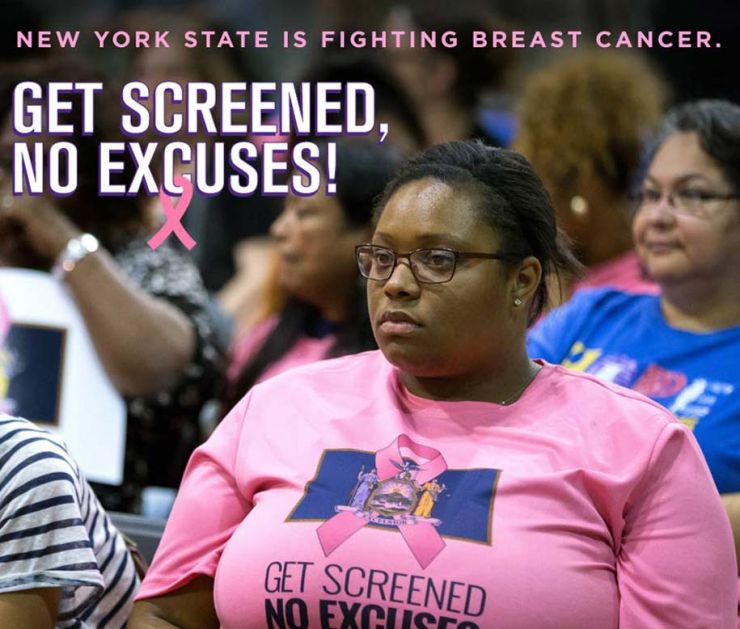Early Detection Is The Best Treatment
August 25, 2016

NYS rolls out the nation’s most aggressive program to fight breast cancer.
According to the U.S. Centers for Disease Control and Prevention, nearly 40,000 women die of breast cancer each year in the United States.
Outside of some types of skin cancer, it’s the most common cancer in women, no matter their race or ethnicity. In 2013, 230,815 women (and 2,109 men) in the U.S. were diagnosed with the disease. Survival rates are shown to improve with early detection. Now, a comprehensive set of initiatives announced June 12 makes New York the state with the nation’s most aggressive action plan to improve access to breast cancer screening. The $91 million package of legislation, which includes the “Get Screened, No Excuses” campaign was originally laid out in Gov. Andrew Cuomo’s January State of the State Address. It expands screening hours, removes insurance barriers, provides mobile screening sites, promotes public awareness or mammograms in underserved communities and communities of color and provides access to healthcare navigators for those diagnosed with the disease.
Tamikio Gallishaw is a CNA at The Cottages at Garden Grove in Cicero, NY. Three years ago she felt scratchy discomfort in her right nipple and thought she needed some new bras.
“I kept doctoring it up myself but it wasn’t healing and that’s when I felt the lump, so I knew I had to go to the doctor,” she says. “But I had been terminated and put off going to the doctor because I had no insurance.”
She went for a biopsy when she got a new job through the Union and regained her health insurance. Her diagnosis was a ductal carcinoma in her right breast and a benign lump in her left breast.
“I just knew it was cancer when they called me. I had a pity party for myself for a few days, but I knew I had to suck it up because that wasn’t going to cure me,” says Gallishaw.
She opted to have a double mastectomy and reconstructive surgery. She’s thankful for support from her husband and six children, including one son who moved back to the Syracuse area from New York City to be near her during the surgery and recovery. Her cancer support group was also invaluable, she says
“It means a lot to women and their families to have help when you are diagnosed. All you hear is cancer and it means death, but support groups help,” she says. “You have help understanding doctors. Often there are so many long words you don’t even know what they’re saying to you.”
Gallishaw practices what she preaches and has become a spokesperson for women’s self care. She’s even been on a poster for early screening.
“We women always take care of everybody else—our children, our co-workers—we have to learn to take care of ourselves. We’re always running everyone to the doctor, but we never go,” she says. “We cannot put ourselves last anymore.”
“At the end of the day [getting screened] is a quality-of-life decision,” agrees Sara Couch, a survivor of triple-negative inflammatory breast cancer. “You can either choose to live or you can take your chances. I wouldn’t be here if I hadn’t sought treatment.”
Couch, an organizer with the Healthcare Education Project in Albany, NY, was diagnosed on Christmas Eve of 2014. She found a lump in her breast while taking a shower. “I was doing a self-exam. I had seen a poster recently and I thought I should do it,” she says.
Her type of non-hormone driven cancer is more prevalent in women under 35. Doctors found a tumor in her left breast and she immediately went through two rounds of chemotherapy. Neither treatment was successful. The tumor returned. She eventually chose to have a mastectomy followed by radiation treatments. A January PET Scan showed no sign of cancer.
Couch, too, holds herself out as living proof of how outreach works. A poster and an exam helped save her life.
“We are really a village and a community,” she says. “And we have to let people know that often this is preventable. Caring for ourselves really is the only option we have. Programs like this are so important. Cancer rates are rising and insurance companies are cutting back on providing preventative care. It’s imperative that we reach out to high-risk communities and all kinds of women—men, too. Having this advocacy throughout our state is amazing.


